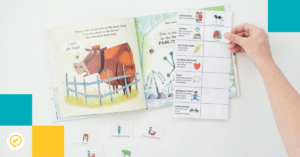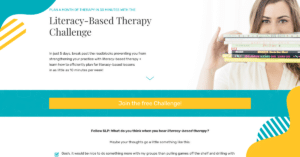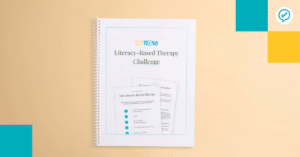Listen on Apple Podcasts Listen on Spotify
Want to hear more about this topic? Click here for all things literacy-based therapy!
This Week’s Episode: Literacy-Based Therapy Ideas for Elementary Learners
In this week’s episode of the SLP Now podcast, Marisha shares therapy plans for elementary learners. Marisha breaks down her planning process and shares practical and engaging therapy activities for literacy-based therapy.
Here’s what we discussed:
[0:45] Therapy Ideas for Step 1 (Pre-Story Knowledge Activation)
[2:44] Therapy Ideas for Step 2 (Reading)
[3:00] Therapy Ideas for Step 3 (Post Story Comprehension)
[3:58] Therapy Ideas for Step 4 (Skill Practice)
[8:15] Therapy Ideas for Step 5 (Parallel Story)
Links Mentioned:
– EdPuzzle: Virtual Field Trip
– Story Grammar Organizer & Literal and Inferential Questions: Included in the SLP Now Membership
– Boom Cards
– SLP Now Smart Decks Included in the SLP Now Membership
– Check out this webinar for more info on teletherapy: How to Implement Digital Literacy-Based Therapy
Subscribe & Review in iTunes
Are you subscribed to the podcast? If you’re not, subscribe today to get the latest episodes sent directly to you! Click here to make your listening experience auto-magic and as easy as possible.
Bonus points if you leave us a review over on iTunes → Those reviews help other SLPs find the podcast, and I love reading your feedback! Just click here to review, select “Ratings and Reviews,” “Write a Review,” and let me know what your favorite part of the podcast is.
Thanks so much!
Transcript
Marisha: For our early unit, the example that we're talking about is using Apple Trouble. Let's talk about some of the different activities we could use across the framework. So the first step is pre-story knowledge activation, and some things that we can do are to just take a virtual field trip of a forest if the students aren't familiar with that.
So one thing that I found while I was looking for some activities, I went on Edpuzzle, and I found a video where it shows like live, well, not live, but it shows video footage of real animals that live in a forest. So I thought that could be a really great place to start. Another activity that I really like to do, I mentioned this before, is story grammar. So I have an interactive story grammar that I created for the SLP Now membership, so it has the organizer, and it has interactive pieces that we can use when we actually get to the interactive story component, but there's interactive pieces.
But what I would do is just duplicate the organizer and then just clear off the icons because we don't need those. And then I would just have the students look at the book and fill, we might take pictures of the book, or we can just write in who we think the character is, and where we think the story happens. And so we would just fill in that organizer, whether I have a laminated version that I'll use and just use dry erase marker if we're doing this in person. Or if we're doing teletherapy, I'll just use the digital template and then go from there.
And then for shared reading, I just read the book. And then with that, I would just, I found the book on Edpuzzle again, and I just went through, I would watch it first to make sure it's appropriate. And then I would just run through that with my students.
Then for post story comprehension, some things that I might do, in my units I have a list of literal and inferential questions so I can pull those. Or if the student needs more support, I have a page of questions with three visual choices, which is really great for the students who really struggle with questions and need much more support. And then if students are kind of in the middle, I might still use the list of questions and just present them verbally, but use other supports, like finding the evidence in the book or whatever that might be.
So that is step three. And then for focus skill activities, this really depends on where the student, what schools the students are working on. But like I mentioned, in the second section of the presentation, we can use a lot of general activities to target students skills. So some things that we might do, if we're working on vocabulary goals, I mentioned the vocabulary journal. So a lot of my younger students are working on categories and object functions and I created some vocabulary pages where we'll go through and we'll come up with like a child friendly definition, if we're working on categories, we'll come up with a child friendly definition. It includes an activity where they identify exemplars or non exemplars of the category and they can go ahead and cross out the ones that are not examples and they can circle the ones that are or whatever floats their boat. And then we can build on that category by adding screenshots from the book that we read or drawing pictures or just writing in examples.
So if we're working on animals and we read Apple Trouble, there's definitely a hedgehog in the story and we can list out the other animals and add it to their category page.
And the cool thing is, this page belongs to the student so if we're doing this virtually, I would create a Google slide document that includes all of their vocabulary pages. And I can go through, if we read Apple Trouble this month, we can add all of the animals in that book, and then if next month we read The Mitten, for example, then we can add in all of those animals. And it's something that we continue to revisit. We continue to revisit the pages and everything, all the things that we worked on. The same goes for object functions.
And then while we're doing these activities, so yeah, it's perfect for the student who has the category goal, but it's still language rich. So if we're working on grammar, we can have the student who's working on grammar create sentences about the animals or non-animals on the vocabulary page. And that will benefit the student who's working on that grammar goal, but it also benefits the student who's working on the category goal because they get more meaningful exposure to that concept and those skills.
So that's one example of what we can do as a focus skill activity. Some other things that we can do, I created boom cards to give more structured practice for a variety of skills like vocabulary, grammar, vocabulary. So that's an option. If we want to do more structured practice with any type of target, whether it's grammar or vocabulary, they have some fun games online. We can create a Jeopardy game and maybe we have different questions on there and then the students are challenged to use their vocabulary targets and their grammar targets. I like doing describing games and things like that. So using simple things, like we might use the vocabulary cards and we'll roll a dice and the student who's working on grammar has to tell me three sentences about the squirrel. And the student working on categories has to tell, if they roll a four, they have to tell me the names of four animals or whatever it may be.
So we can do different types of activities and just be strategic in how we set them up to target a variety of goals. And then with the parallel story, again I would open up the graphic organizer and have students fill that in. And I like to create the graphic organizer in Google slides. So we would just create different pages, type in the text. And we could take screenshots from the story, we could find Google images, we can take our own photos, whatever it may be. We can set that up. And I do have a separate video that shows kind of a walkthrough of how to set up your own slides to make that happen.
So if you're interested in that you can reach out to us at hello@slpnow.com, and we can kind of share that tutorial. Okay. So, that wraps up the early plans.
Sign up to receive email updates
Enter your name and email address below and I'll send you periodic updates about the podcast.




Reader Interactions